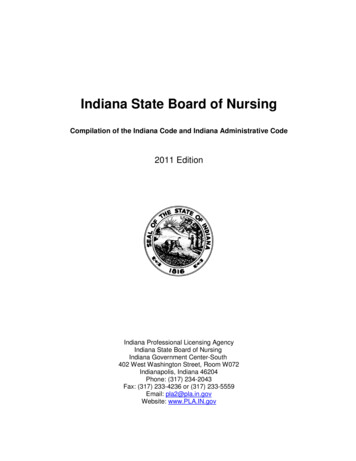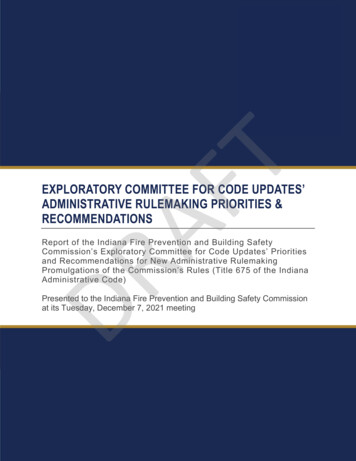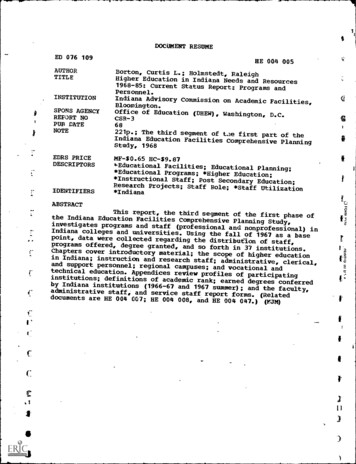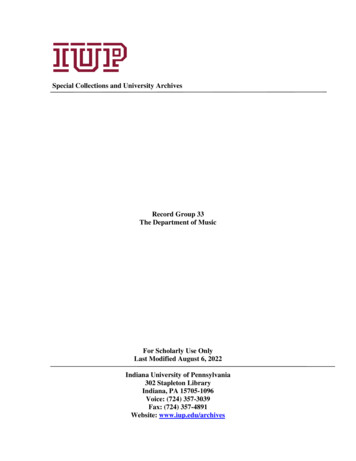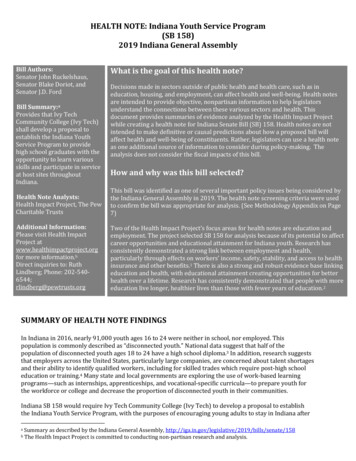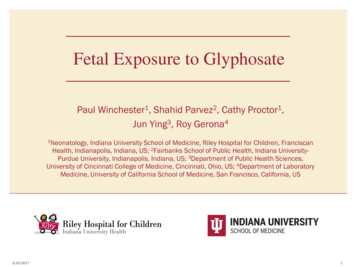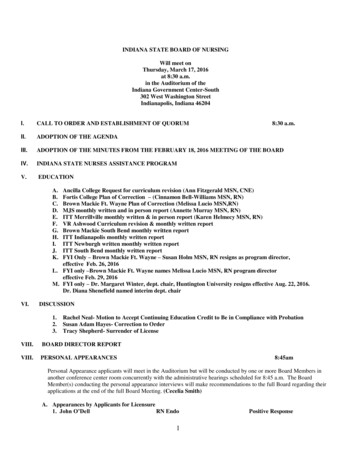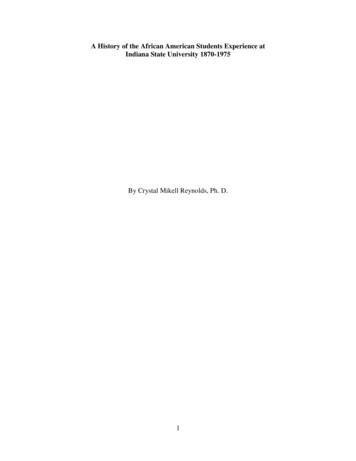
Transcription
.ULAYA DTAYLOR, l'RINTERS.i : J
INTRODUCTION.THE present volume 'aims at giving in a compact and handy formall that thereis of value to the' student of dialects in the EnglishDictionary of NathanIel Bailey. Of all our lexicographe s whopr!\cedeu Dr. Johnson, he was the most popular, and though hiswork was eventually beaten out of the field, it did not yield withoutstruggle. There wer sever l editions after the year 1755, thememorable year.in which the result of Johnson's labours firstappeared, and even as recently as 1802 there wits an edition issuedat Glasgow. .As Bailey's work first appeared in, 1721 it had nearlya century of popularity and usefulness. ' Of the author very little isknown, but if it be true that the biography of an author is thehistorY of his books, we are not entirely without materials foraLife of Bailey.The first edition afthe dictionary appeared in 1721,' and it 'maybe convenient to give here such particulars as ,are kilOwn of itsbibliography: ,aI\I'1721. An Universal Etymological English Dictionary: compre, hending the derivations of t4e, generality of wor in the'English tongue . together wi h alarge collection nd expli- ,cation of 'Words and Phrases 'used. in our ancient Statutes,, . ,,&c. . :' also the Diale ts f our, different C(;lUnti s . to,which is, added a Collection of our most common Proverbs,withtheir Explicatioilatid'n ustratio " ByN.B ileYI.\' .:-;t/'IXOXOY0I;. London, 1721. .,'; ',:'It
VIINTRODUCTION.1724, Svo. The second edition.1726, Svo. The third edition.1727, Svo. First edition of a supplementary volume containingadditional words called" Volume II." See 1731.172S, Svo. The fourth edition.1730, Folio. [The first edition, entitled] '" Dictionarium Britannicum,' or a more Compleat Universal Etymological EnglishDictionary than any extant, collected by several hands. ThoMathematical part by G. Gordon, the Botanical by P. :Miller.The whole Revis'd and Improv'd with many thousandAdditions by N. Bailey." It was dedicated by Gordon andBailey to Thomas Earl of Pembroke. It contains a greatnumber of technical terms, but the. proverbs, proper names,&c. are omitted. An interleaved copy of this edition wasthe foundation of Johnson's Dictionary.1731, Svo. The fifth edition, t, with considerable improvements."1731, Svo. Supplementary vol. entitled 'The Universal Etymological, &c.,' "an additional collection of words not in th efirst volume." It is marked "Volume II." and has" 500cuts."1731, Svo. Second edition of Vol. II.1733, Svo. The sixth edition, " with considerable improvements."1735, Svo. The seventh edition, "with considerable improvements."1736, Folio. The second edition, "with numerous additions andimprovements."1737, Svo. The eighth edition.1737, Svo. "The third edition," and the supp!Eiment called"Volume n."1740, Svo. The ninth edition.1742, Svo. The tenth edition.1745, Svo. The eleventh edition.1741; 8vo. The thirteenth edition, "with considerable· improvements."1749. The thirteenth edition.1749. The fourteenth edition.
·INTRODUCTION.1751, 8vo.1753, 8vo.VllFourteenth edition. .'Fifteenth edition.1755, 8vo. Sixteenth edition. Price 68.1755, Folio. A new Unive sal Etymological Dictionary [title asbefore]. "And now republished with many corrections,additions, 'and literat improvements by different hands. , .By, Joseph Nicol Scott, M.D."1756, 8vo. Fourth edition of "Volume II."1757, 8vo. Seventeenth edition. Price 68.1757, 8vo. Seventeenth edition.1759, 8yo. The New Uni \ ersal English Dictionary. " The fourthedition [of the supplement] carefully corrected by Mr.Buchanan." Possibly the reviser may have been JamesBuchanan, who published "Lingua Britannica, vera Pronuuciatio: or a new English Dictionary," 1757, and" AnEssay towards establishing a standard for an elegant anduniform pronunciation of English Language." London, 1766.1759, 8vo. The seventeenth edition.[The Rev. William Mead Jones, the minister of Mill YardSeyeuth Day Baptist Chapel, has a copy of this editionwith the following memorandum by his predecessor, theRev. VY. H. Bla k, F.S.A.: "This book belonged to mywife's father (the late William Slater, my predecessor)" towhom it was given by his eldest brother John, who hadit (I suppose) from his father, John Slater, a contemporaryof the Author and fellow-member with him of the lYIiIIYa,d Church. The four Slaters above-named died respectivelythus: John,176-; Johnin 1809; William in 1819;,Harriot in 1861.-W: H. Black."]1760, 8vo. Vol. II. TIle fifth edition corrected and improved. . .,By Mr. Buchanan.1761,8vo. A German translation, "bey dieser dritten Auflage aberurn noch mehr as die haUte vermehret, von Theodor Arnold. :Leipz. und Zullichau."l'761,8ve. Eighteenth edition.1163, 8yo. The twentieth edition.
VlllINTRODUCTION.1764, 8vo. The twentieth edition.1764, Folio. This, with Dr. Scott's additions, is described byLowndes as the bcstedition.1766, 8vo. The one-and-twentieth edition.1770, 8vo. Twentieth edition.1770, 8vo. The two-and-twentieth edition" with improvements."1772, Folio. Revised and corrected by J. N. Scott, M.D.1773, 8vo. The three-and-twentieth edition.1775,8vo. The fifth edition [of the supplement].1776. Twenty-fourth edition.1782, 8vo. The four-and-twentieth edition carefully enlarged andcorrected by Edward Harwood, D.D. Price 7s.1783, 8vo. A new edition, being the twenty-fifth.1790, 8vo. German translation by Arnold. Neue verbessert undvermehrt von Anton Ernst Klausing, P.P. Sechste Auflage.Leipz. und Zullichau.-1790, 8vo. Twenty-fifth edition.1792, 8vo. German translation, ed. Klausing, 8 Auf. Leipzig.1802. Thirtieth edition, printed at Glasgow.1810, Bvo. German translation. "Gauzlich umgearbeitet vonD. Johann Anton Fahrenkriiger. Elfte, verbesserte undvermehl'te, Auflage. 2 Theile, Leipzig und Jena, 1810." The dedications to the dictionary," says nfr. J. E. Bailey, "are asconfusing as the editions themselves, until all the variations are col- "lected." These are given in 'Notes and Queries,' Fifth series, III. 510.These bibliographical details are largely derived from 'Notesand Queries,' and especially from two long and carefully-writtencontributions by Mr. J. E. Bailey. (See ' Notes and Queries,' 5thSeries, i. 448, 514; ii. 156, 258, 514; iii. 175, 298, 509; iv. 276;vii. 447; viii. 52.)". In the first edition there is an advertisement of N. Bailey:"Youth Boarded and· taught the Hebrew, Greek, and Latinlanguages, in a Method more Easy and Expeditious than is comman; also other School-Learning by the Author of this Dictionary,to be" heard of at J.fr. Batley's, Bookseller, at the sign of -the Dovein Paternoster ROll', &c."
IXINTRODUCTION.This advertisement would appear to claim for the lexicographeran acquaintance with the sacred tongue, but the followingcommunication from Dr. A. Neubauer would seem to show that hewas not a very profound Hebraist : "My attention was lately drawn to a Rabbinical quotation inBailey's' Etymological English Dictionary,' which I find is not onlyfull of mistakes, but has very little eonnexion with the sayingreferred to. Bailey's article is the following: ' Give him a Rowlandfor his Oliver.-This proverb in terminis is modern, and owes itsrise to the Cuvaliers in the time of the civil wars in England, whoby way of rebuff gave the antimonarchical party a General Monk fortheir Oliver Cromwell; but as to the matter of it, it seems to proceedfrom the ancient Lex Talionis, or law of retaliation, an eye for aneye ;.but Christians ought to be of a better spirit, maugre theprivate revenge either of hard words or rude actions, as say theHebrews,l' , " m , ., .,n., t:! . :l "!:l" j"i' i "Ji w n j"l'I simply give the correct reading of the saying without mentioningBailey's mistakes in it, and without discussing the various readingsof it both in editions and in manuscripts. The translation of it isthe following: 'If one says to thee that thy ears are those of anass, do not care for it [or according to another reading, do not believeit]; if two [say so], prepare for thyself [or according to anotherrf\ading, make for thyself] a bridle;' i.public opinion is alwaysright. How Bailey, who gives no translation of the Rabbinicalsaying, was misled, I cannot say." (' Athenreum,' No: 2778, Jan.22nd, 1881.)It is hardly necessary to say that Bailey's explanation of the" rise" of the proverb is wrong. The old phrase refers to the Rolandand Oliver of the twelve peers, though the circumstances of theCivil War may have led to its.revival.It is probable that Bailey's inclusion of proverbs added to thepopular favour with which his dictionary was regarded. From thisand some other sources were taken the mat{jrial of the little volumee.,*
xINTlWDUCTlO:-1.of 'Proverbs, English and Hebrew,' which appeared under the careof 1111'. ,\YilIiam Carpenter in 1826. The adages made the work amanual of practical ethics, as ,yell as a storehouse of hard wordsfrom which sesquipedalian sentences might be constructed in eulogyof friends, or enigmatical reproach be heaped upon foes. Dailey hasnot been without admirers and diligent students. The great LordChatham, with a wholesome catholicity of taste, was fond of )JalTow'sSermons, and Dailey's Dictionary, which he had read through twicefrom beginning to end. A copy with the autograph of ,Yo Pitt onthe title-page is recorded in' Notes and Queries,' 5th Series, i. 448.It was one of the few books of "Adam Dede." It is interesting toknow that Johnson used this dictionary. '\Vhen he began to collectfor his own work the materials were committed at first to an interleaved copy of Dailey.Chatterton was perhaps a still more diligent student of Dailey. Itwas from this source that he derived the antique and sham-antiquedialect of the Rowley Poems. The proofs of this are to be found inabundance in 1\11'. Skeat's essay in the Aldine edition of Chatterton.It may be useful to quote a sentence or two that will show this : "The Rowley Poems owe but little, after all, to Speght's Chaucer.I suspect that Chatterton soon tired of copying out words fromSpeght's Glossary, and ere long discovered that there was a stillshorter cut to a ready knowledge of (supposed) old English. As heoccasionally peered into Kersey's Dictionary, his quick eye wouldsoon discover that Kersey had copied from Speght largely, and thatto possess Kersey was to possess Speght, and a great deal more.Dut how to tell the old words from modern This Kersey, by asingular accident, had done for him, by marking aU the (supposed)old words with the letter 0, denoting old in which he was carefullyfollowed by Dailey. In fact, Kersey's and Dailey's Dictionaries arealmost one and the same thing; the differences are trifling and thegeneral resemblances close." Mr. Skeat then gives a letter from"Chatterton to his friend, WIlliam Smith, filled with long words ofwhich eephalophonia and ecphonesis are fair and sufficient examples.The text of this letter, which was full of misprints, i'tIr. Ske"at hasrestored by the use of the old dictionary.
INTROD1:CTlO .Xl"'Vho can now doubt," asks Mr. Skeat, "that Chatterton wasfond of picking out hard words from Kersey 7 Of the two dozen longwords employed by Chatterton in the course of this short letter,Kersey has everyone. Hcre, in short, is THE KEY to the 'RowleyPoenis.' Chatterton has there employed no old u'ol'ds whafevel' butsuch as al'e contained in Kersey 0]' Speght, the only exceptions to thisrule occurring in the case of a few words which he modified 0]'invented. If we take Rowley to be a mere pseudonym for Kerseyor Bailey, we shall hardly ever err. .And farther, we may lay downthe broad general statement, that the language of the Rowley Poemsbears no closer resemblance to the language of the fifteenth centurythan the language of the letter above quoted bears to modern English.How close a resemblance that is, can be readily appreciated.".Although the Dictionary was Bailey's chief book, it was not hisonly ,,·ork. The others must be more briefly noted.The following titles show that he made some considerable contributions to scholastic literature.An Introduction to the English tongue: being a spelling IJook, intwo parts. London, 1726. 12mo.P. Ovidii Nasonis Epistolae cum Versione Latina prosaica etNotis .Anglicis It N. Bailey. Loncon, 1744. 8vo. Reprinted 1762,&c. (Lowndes).P. Ovid i Nasonis Metamorphoses eum Versione Latina prosaiea etNotis .Anglicis 11 Nathan. Bailey. London, 1724. 8vo. Rlprinted1730,1741, and since (Lowndes).All the Familiar Colloquies of Erasmns. London, 1725.The Familiar Colloquies of Erasmus. Latin and English, byN. Bailey. London: 1733. 8vo.'The 'Vhole Familiar Colloquies of Erasmns,' translated by NathanBailey. London: Hamilton, .Adams and Co., 1877. On this editionthe' Glasgow Herald,' 17th May, 1877, very judiciously observed:" vVe must express a regret that this edition contains no introductionsave sixteen lines of an' Editorial Note.' 'Ye had expected to finda preface with bibliographical and other particulars, without whichthe volume is manifestly incomplete. Nor can it be urged in excusewith any show of reason that this "'ould be. caviarc to the- general,'
Xl!H\TRODUCTION.fol', as we remarked above, the r Familiar Colloquies' can never IIIthis age appeal to the general public, except in vain. ""Ve llOpethat, shonld another edition be called for, the editor will rectifythis, and give some kind of information as to the dates of thevarious early editions, their pnblishers, the circumstances underwhich printed, &c., instead of sending the reader to hunt for himselfthrough half a dozen volnmes to obtain the information which mightllave been given in as many pages."The Colloquies of El'llsmns. Translated by N. Rliley. Editedby the Rev. E. Johnson, ilI.A. London: Reeves and Turner, 1878.2 Vols. 8vo.It is pleasant to find that Bailey had a genuine liking for Erasmus."Tho' Erasmns," he says, "is so well known, especially to thoseversed in the Latin tongue, that there seems to be but little Occasionto say anything in his Commendation; yet since I have taken uponme to make him an English-man, give me Leave to say, that, in myOpinion, he as well deserves this Naturalization as any modernForeigner whose IVorks are in Latin, as well for the usefulness of theilIatter of his Colloquies, as the Pleasantness of Style and Elegancyof the Latin." After enlarging at some length upon the charms ofthis" golden book," he concludes: "I do not pretend to have comeup in my English to the Life and Beauty of Erasmns in Latin, which,as it is often inimitable in the English Language, so it is also a Taskfit to be undertaken by none but an English Erasmus him e1f, i. e.one that had the same Felicity of Expression that he llad; but Ihope it will appear that I have kept my Author still in my Eye, tho'I have follow'd him possibliS ltaud reqllis, and could seldom comeup to him. I shall not detain you any longer, but subscribemyself," Yours to serve you,"N.BAILEY."Jan. 25th, 1724-5."The editor of this latest issue, who has added a number of notes,says that the chief peculia ity of Bailey's version" is its reproductionof the idiomatic and proverbial Latinisms, and generally of the
INTRODUCTION.xiiiclassical phrases and allusions in which Erasmus abounds, in corresponding or analogous English forms. Bailey had acquired, perhaps,from his lexicographical studies, a command of homely and colloquialEnglish; the words and phrases by which he frequently npresentsrather than construes Erasmus' text have perhaps in many instancesnot less piquancy than the original. Thus his translation, as a pieceof racy English, has a certain independent value of its own, and maybe read with interest even by those who are familiar with theoriginal." Some portions omitted by Bailey are here restored.The Antiquities of London and Westminster, 1726. 24mo. (Chalmel's.) Third edition. London, 1734. (A full copy of the titleand a collation is gh:en in Upeott's 'Bibliographical account of booksrelating to English Topography,' London, 1818, p. 684.)Justin's History, Lat. and English, by N. Bailey. London, 1732.8vo. For the use of schools (Lowndes).Dictionarium Domesticum, being a new and compleat Dictionaryfor the use both of City and Country. London, 1736. This wasreprinted and on sale as late as 1779.Phaedri Fabulre, with an Ordo, English Notes, and a copiousParsing and Construing Index, by N. Bailey. Dublin, 1783. 8vo.Twentieth edition. London, 1823. 8vo. (Lowndes).Chalmers names in addition a book of Exercises, "still in use."(Biog. Diet. 1812.) The only copy of this which I have been able totrace is in the great Public Library of Boston, Massachusetts. It isthus catalogued: English and Latin Exercises, 17th edit. Londoll,1786. 16mo.Chalmers rather doubtingly states that Bailey was believed tohave been a Sabbatarian. The meaning of this word has ratherchanged, and, as used by Chalmers, it meant a member of the sectof Seventh Day Baptists, or Sabbath-keepers, who, like the Jews,observe Saturday as the day of rest. It occurred to me that if sohe must probably have been a member of the :Mill Yard Church in'Vhitechapel, The 'Rev. W. Mead Jones, the Minister of the SeventhDay 'Baptist Congregation, immediately confirmed my conjecture.The name of Nathaniel Bailey is on the church books, and there is atradition identifying this name with the lexicographer.
xivINTRODUCTION.:Mr. Jones has very kindly searched these records, and favouredme with the results. The names of "Richard Bayly" (p. i)," BrotherBayly, Sarah Bayly" (p. ii), "Mich. Bayley," arrel "sis.[ter] Baly"(p. iii) occur from 1673 to 168 , and it is worthy of remark that'Watt gives this form of spelling as a variant of the lexicographer'sname. The following entry shows the date of Nathan Bailey's admission: "At the same meeting, ye same time, ye 6th of ye 10th month,1691, The case of Mr. Gardner and his wife, of Nathan Bayly, ofNathaniel Downes, was considered iIi Relation to their propoundingfor Baptism and Church fellowship and the Church, after theysecured considerable Testimony of ye Sincerity and Spotlessness oftheir conversation; The Church concluded of Baptizing of them yefirst day following" (p. 42). His signature occurs amongst othernames appended to business transactions: 1692, Nat. Bailey (p. 43),1696, Nath) Bailey (p. 66), 1703, Nath) Bailey (p. 143), January yo6th, 17H, Nath: Bailey (p. 203). The register of burials at :rillYard contain three entries which have to be quoted:1733, Feb. ye 16: Mr. Bayley's model' in law, 8/6.1738, Jan. 8: For Mrs. Bayley of Stepney, 3/.1742, July 4: Mr. Bayley, 3f. *From this we may probably gather that whilst Bailey and his wifewere both Sabbath-keepers, his mother-in-law had views of her own jand not being a member of the church, a higher fee had to be paid forher funeral rites. The last entry shows us that the resting-place ofNathan Bailey is at 1\1ill Yard, although there is now no memorialstone to mark his grave. It is possible that in the course of. contemplated railway changes church and graveyard alike will shortlydisappear. In that case the remains of tho dead will probably Lotransferred to Abney Park Cemetery.In his folio dictionary Bailey has an account of the Seventh DayBaptists, and in the octavo he describes the word Sabbalarian as.a "name given to some Anabaptists, or rather Baptists, who 01l8erve The 'Gentleman's Magazine' for July 1742 hasthe following in its" Listof Deaths":June 27 : Mr. Nathan Bailey, Author of the English Dictionary, and Editorof several Classic Authors for the Use of Schools.
INTRODUCTION.XySaturday as a Sabbath." The word Sabbath is described as "theseventh day of the \Veek, observed as a day of Rest, in commemoration of God's resting after the Sixt,h bay of Creation; or the firstday of the week among Christians." Here the ordinary misapplication of the word to Sunday is only, as it were, admitted underprotest. It is curious that Bailey, who shows a wide acquaintancewith the names of sects and heresies, and who has both Auabaptistand Catabaptist, has no definition for Baptist except as "a title ofJohn the Baptist, the Fore-runner of our Saviour." The SeventhDay Church in Mill Yard has a strange and interesting history. Itwill be familiar under a thin disguise to the readers of WalterBesant's novel of ' All Sorts and Conditons of Men." The membersof this struggling, isolated sect-an oasis of "Sabbath-keepers" inthe midst of the desert of "Sabbath-breaking" London-haveincluded Dr. Peter Chamberlayn, Thos. Bampfield, the Speaker ofthe House of Commons, the two Stennets, ·William Tempest, :F.R.S.,and that late accomplished antiquary, the Rev. 'IV. H. Bhtck, F.S.A.The. present minister, the Rev. 'IV. 1\1:. Jones, is the editor of the'Sabbath Memorial,' and is reprinting the rare seventepnth centurytract which records the judicial murder of the Rev. John James,"a Sabbath-keeper," whose death is one of the many blots upon thereign of Charles II. Mill Yard Chapel is iu pleasing contrast to thesqualor by which it is surrounded, and with its other memories wemay now associate the name of Nathaniel Bailey, the author ofa Dictionary, of which the weakest parts are those in which heavowedly depended upon others, whilst the excellence of the planand the spirit and industry with which it is executed are his alone.It may be well to add here the few authorities as to Bailey's lifeand works :-Chalmers's 'Biographical Dictionary'; 'Gentleman'sMagazine,' xii. 387; Nichols's 'Literary Anecdotes,' viii. 479;'Chronological Notice of the Dictionaries of the English Language,'by H. B. Wheatley (Transactions of Philological Society, 1865);Watt's' Bibliotheca Britannica'; Lowndes" Bibliographers' Manual' ;Allibone's 'Dictionary of English Literature.' The account nowgiven, scanty as it is, is the fullest that has yet been written.vVe must give Bailey the credit for an eafly recognition of the fact
XYIINTRODUCTION.that dialectal words have a good claim to be considered English. Sofar from apologizing for their inclusion, he boldly puts on his titlepage as one of the attractions of his work, that it contains "thedialects of our different counties." To pick out the dialect words hasnot been an easy task. In some cases they are described by theinitials for West Country, North Country, and so forth. Many aremerely stated to be "Country Words." A large number are notmarked at all. There are also trade-words and canting phrases.Finally a certain number have the county in which they were usedclearly indicated. The method on which the present volume hasbeen compiled may be described. The editor's copy of Baileyprofesses to be the thirteenth edition, and was printed in 1749.Every word in this which in the editor's judgment would be" wanted" for the future Dialect Dictionary was marked for theprinter, and the result was checked by a copy of the seventh edition,1735, belonging to Mr. Skeat, and similarly malI,ed by him. It isto be hoped that nothing of importanee has escaped from these twoindependent examinations of the work. As to some words individualjudgments will always vary, and what one is disposed to acceptanother may quite unhesitatingly reject. The annotations, thenumber of which might have been largely incrcased, have been addedby the Rev. W. "'IvV. Skeat, who has, a usual, given the most liberaland ungrudging help. It must be said, once for all, that this is afaithful reprint of Bailey, and that the task of correcting hisetymologies has not been attempted. The game would not be worththe candle, and as they stand they have a certain historical interest,as showing what an educated man supposed to be the history of thewords composing his own language. "Bailey's Anglo-Saxon," aslIfr. Skeat observes in a recent letter, "is in a fearful state. Hequotes the worst fictions of Somner's Anglo-Saxon Dietionary, nothaving other help. He cannot in any instance be relied on, thoughhe sometimes is right by luck. Even Greek and Latin words are'sometimes misspelt, but these do not matter, as the. reader canmore easily set them right." The quality of his Hebrew has beenindicated in the note of Dr. Neubauer. After admitting ,all thedf'fects of Bailey, it remains to be said that his work contains much
INTRODUCTION.XVllexcellent dialect material. It would occupy too much space toclassify the whole of it, but it may be well to give the wordswhich he has markecl as belonging to separate counties.Cheshire: Annder, Onedher, Beer, Birre, Bloten, Bont, HatBruarts, Cant, Charterer, A Cranny Lad, A Crassantly Lad, Creemit into my hand, To Dight, A Dosom Beast, To Eein, Eever,Esse, Sheer the Esse, A Fow, To Glaffer, Glob'd, Gloten, ToGuill, Hill-Houter, Kale, To Keeve a Cart, Leeten you, Lithing,Oneder, To Osse, A mad Pash, Shed Rivers with a vVhaver, ToSleak out the Tongue, 'Welly moidered, 'Welly moyder'd, 'Vharre,vVheam, vVhem, To vVhite, To Whoave, vVhookt, vVhowiskin,"\Vork-Braccho.Gumbel'land: Attercob, A Boor, An Ell-mother, 'Vhere Furedyou 1 Hine, Kite, To Late, The Lave.Derbyshire: Doundrius, lIferry-Banks, Shoods, Skellard, TheYeender.Durham: Hell-Kettles,Devonshire: 1'tIuckson up to the Huckson, Quarrington, A Hinderling,Essex: Ails, Bigge, Bullimony, Bullimong, A Cart Rake, Dare,A Hale, Hornchurch, Newing, Mad, To Not, Paddock, Ree, A Stull,A Yeepsen.Kent: Cledgy, A Hagester, Haw, Knolls, Ravel Bread, Swath,Swarth, Tag, 'Vbicket for vVhacket.Lancashi1'e: Braughwham, A Craddantly Lad, A Gaul, Land orLant, To Reen, To Shead, Sth'k, Sturk, "reel, A Wogh.Lincolllshi1'e: Addle, Bracken, Bulkar, Clumpt, To Coath, CockApparel, Coke, To Dacker, Dike-reeve, To Flit, Frim.Folk, To Gly,An Hack, A Sea Harr, Hash, A Mort, Hoppet, To Joist, A KaarlCat, A Keal, To Klick up, Meath, Pintledy, To Rift, Shan, Sillibauk,Slim, A Sliverly Fellow, To Slot, Smiting, Snithe·Wind, To Sowlone by the Ears, Stunt, To Teem out, Tharm, Tharn, To Thirle, Tol'hrave, Wilk,, Norfolk: Boun, A Break, Caddow, A Cobweb Morning, CrawlyMawly, Footing-Time, To Frase, Mauther, Modder, Modher, Near:Now, W oadmel.
XYlnINTRODUCTION.Norlhwnue1'land: Maum, \Vear, 'Veer.Nottiuglwmsltire: Addle, Amine.Oxfordshire: Ripe, Maum.Shropshire: Kemmet.Somersefshi1'e: To Yang.Suffolk: Bain, The Bird of the eye, Bostal, Brine it hither, ToBrutte, The Buck, Chavish, A Chuck, To Heal, Hornicle, Kedge,Long it hither, Lourdy, A Nail of Beef, Ope-Land, Say of it, A Seam,A Shawel, Sheld, To Shimper, To Shun, Sibhered, Sidy, Simpson,Skeeling, Show, A Slapel, A Snag, A Snag, A Stoly-House, AStound, The Strig, A Stuclding, Stufnet, To Sworl, Tharl{y, Tl'Uets,To Tl'Ull, To \Vimm, 'Voadmel.Sussex: A Bud, Herst, Rapes, A Ripper, Tl'Ugg, To Waspe, A'Vhapple.Wiltshire: Litten.lVorcestershire: Charks.York hire: Bargh, Beating with child, To Bensil, Body, Bondy,Bumblekites, To Cant, Croft, Dannaught, Dondinner, A Donnat, ToGoam, Goetie, Hell-Beeks, To Lowd, 1\finginater, Shirt-Band, Spice,To Thropple, The Tropple, 'Vay Bit, Whee, \Vhey.Such is the county list. It may be well to point out the largonumber of cant words as shown in the following list:Cant: Abram Coue, To Bleed, Bord, Bouncing Cheat, Buck, ABudge, Bulk and file, Bulker, Clapper Dudgeon, To Cly the J erc, Cove,Cmp, Crashing Cheats, Darkmans, Dell, Delve, Deuseaville, Deuswin,Dommeror, Fambles, Famble Cheats, A Fence, fencing Culley, ToFence, Flag, To Fleg, Fogus, Frumlllagem, Gentry Cove, A GentryMort, A Glim, Glimfenders, A Glimmer, A Glym, Glym-Jack, Glymstick, To Gnapp, Gropers, Grunting-Peek, Half-Bord, The Heaver, AJob, Kinchin, Kinchin-Cane, Lap, Lappy, Lightmans, Lour, Milken,1\fish, Mish-Topper, A Moon-Curser, A Mort, Mow-beater, 1\fower,Muffling Cheat, Nab, Nab-Girder, Nab-Cheat, To Nab, Naper ofNaps, Nasie, Nub, Nubbing, Nubbing-Cheat, Nubbing-Cove, Ogles,Old Mr. Gory, Pad, Panter, Pappier, Peeper, Peety, Penbank, Prance,Prating Cheat, To Prig, Prigs, Prig-star, Prig-napper, QuackingCheat, Queer, Rattler, Rattling Cove, Rattling Mumper, Ridge-Cully,
INTRODUCTION.XIXRoyal Poverty, Ruffian, Ruffler, Ruff-Peck, Rum, Rum-boozing-welts,Rumboyl, I{,um Cully, Rum-Dropper, Rum-Gutlets, Rum-Hooper,Rum-Padders, Rum Ville, A Smacking-Cove, Smelling Cheat, AStall "Vimper, Stalling Ken, To Stamflesh, Stampers, Stamps, StockDrawers, Stow your IVhids, A Swag, Sweath, Tib of the Buttery,Trundlers, Tumbler, IVhids, "Vhit, "Vitcher, IVitchcr-Bubber,Witchcr-Tilter, Witcher-Cully.In coming to the end of his task, the editor, whilst conscious ofthe inadequate manner in which it has been performed, yet venturesto hope that it may be found serviceable. For quaint N. Baileyhow rarely he is allowed, or allows himself his full name of Nathaniel-the editor has always had a kindly·feeling, derived from youngerdays, when many pleasant hours were spent in conning his pages,studded with words of fearful length and cacophony, and hidingas often as revealing matters of mysterious import. He who saidthat language was given to man that he might conceal his thoughtsmight have been one of Bailey'sstudellts. But his merits are greaterthan his demerits. He had a genuine love for his work, and whilsthe may have gloated over the capture of words that are happily notused twice in a century, he did not disdain homelier phrases, andcarefully recorded the words used by the sailor before the mast, bythe carpenter at the bench, by the plowman in the ficld, by thepeasant as he took his rustic ease beneath the village oak, and by themumping cadger as he lazily strolled along the green lanes of oldEngland, with a fixed determination not to do a stroke of honestlabour as long as there were hard-working folk to be wheedled orrobbed. We may overlook his etymologies, " very few" of which,he is careful to tell, are his own, but he has "the suffrage ofSomner, Cambden, Verstegan, Spelman, Casaubon, Dr. Th. Henshaw,Skinner,* Junius, Menagius, Minshew, and other great Names andapproved Etymologists," to bear him out; we may even forgive hisetymolog
This, with Dr. Scott's additions, is described by Lowndes as the bcstedition. 1766, 8vo. The one-and-twentiethedition. 1770, 8vo. Twentieth edition. 1770, 8vo. The two-and-twentiethedition"with improvements." 1772, Folio. Revised and corrected by J. N. Scott, M.D. . Bailey's mistakes in it, and without discussing the various readings of it .
